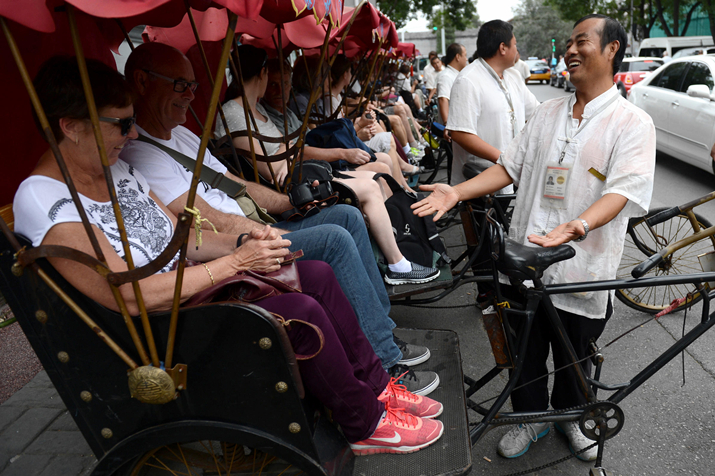|
||||||||||
| Home Nation World Business Opinion Lifestyle ChinAfrica Multimedia Columnists Documents Special Reports |
|
||||||||||
| Home Nation World Business Opinion Lifestyle ChinAfrica Multimedia Columnists Documents Special Reports |
| Lifestyle |
| Three Wheel Preservation |
| Beijing's old tricycle entrepreneurs add a touch of history to the city |
| By Hannah Wanjie Ryder ·2017-10-31 |

Three-wheeled electric vehicle
I call them the "old entrepreneurs." They are the people who made me feel at home when I first arrived in Beijing three years ago. Not because they invited me to their homes. In fact, I've never been to any of their homes. Nor because they treated me exceptionally well. I know for a fact that many may have tried to rip me and other newly arrived foreigners off all the time, and still try to!
No, it was simply their presence that made me feel like I was not in such an unfamiliar society. They were the people steering three-wheeled electric vehicles through the streets. Drivers speed by so fast that people dismissively call the vehicles "death carts." They were the people selling street food and fruit on carts on the side of the road, the man clacking metal loudly to announce he is here to sharpen knives or another with a loudspeaker saying he will do small home repairs of any sort.
These are small businesspeople, often totally hidden in terms of tax and other formalities, often very poor, who currently account for a large percentage of GDP and jobs in most developing countries, or the "informal economy." And China, even while growing faster than most other developing countries over the last 40 years, still has these "old entrepreneurs." Even today, China's "informal economy" is estimated by the International Labor Organization to a-ccount for over 30 percent of employment in urban a-reas. Kenya's figure is larger. Across Sub-Saharan Africa, the informal jobs account for two thirds of the entire employment market.
Here in China, as in Kenya, the three-wheeled electric vehicle drivers and street food sellers are often looked down on ostensibly because of their poverty. Stories are spun about matatu drivers in Kenya and their unreliability. But I admire these small startups in the informal sector as much, if not more than the "new entrepreneurs" on the search for venture capital and venerated in tech magazines.
They might not be able to read very well, and certainly haven't been to university, but I often think they have a great deal to teach us about how to run a successful business from scratch.
That said, here in China, as in many other developing countries, the old entrepreneurs are under threat. The threat is to their business venues, which are often unregistered or in residential rather than commercial property. And the other threat has been the rise of new, much larger businesses that offer competing service-s. Take Ofo or Mobike, for example, which offer bike s-haring services. These are innovative and welcomed, but they also directly replace the small three-wheelers for short trips to and from the subway station or to the supermarket. Online delivery services or waimai are also wonderfully convenient, but they also replace the street food seller trying to make as much money as they can.

Hannah Wanjie Ryder
The heads of Mobike, waimai and other innovative services are, of course, recent startups themselves, innovative and having taken many risks. Many have failed, too. But they are also corporate giants in comparison to my "old entrepreneurs" who reminded me so much of home on my arrival in China.
As subtle and progressive as they seem, these economic shifts away from informality in any country are not spontaneous. They are deliberate decisions, and they impact the lives of "old entrepreneurs" that have worked hard all their lives to provide a service to others and taken big financial and personal risks.
Of course, if these "old entrepreneurs" move back to smaller cities and rural areas, here in China, they will be much more fortunate than in the past. For example, because of strong energy and Internet access infrastructure and investment from the government, combined with tech giants like Jack Ma, they can now, at quite a low cost, make products to sell online via giant retailer Taobao and receive online payments immediately.
But these online markets are not easy, either. Competition is fierce. The most profitable sellers have to invest in marketing. Every cut, even if tiny, is a contribution to making a large company like Alibaba an even larger one.
One of the reasons I love living in China is because of its entrepreneurialism. It is dynamic, innovative and reminds me so much of Kenya in that way. I hope the changes both countries will go through will preserve this character, and make sure the new and old entrepreneurs can survive and succeed together.
(The writer is a Kenyan-British diplomat, economist and writer living in Beijing)
|
||
| About Us | Contact Us | Advertise with Us | Subscribe |
| Copyright Beijing Review All rights reserved 京ICP备08005356号-5 京公网安备110102005860号 |